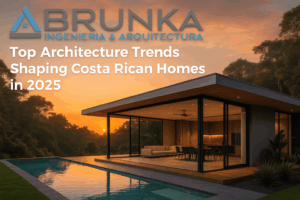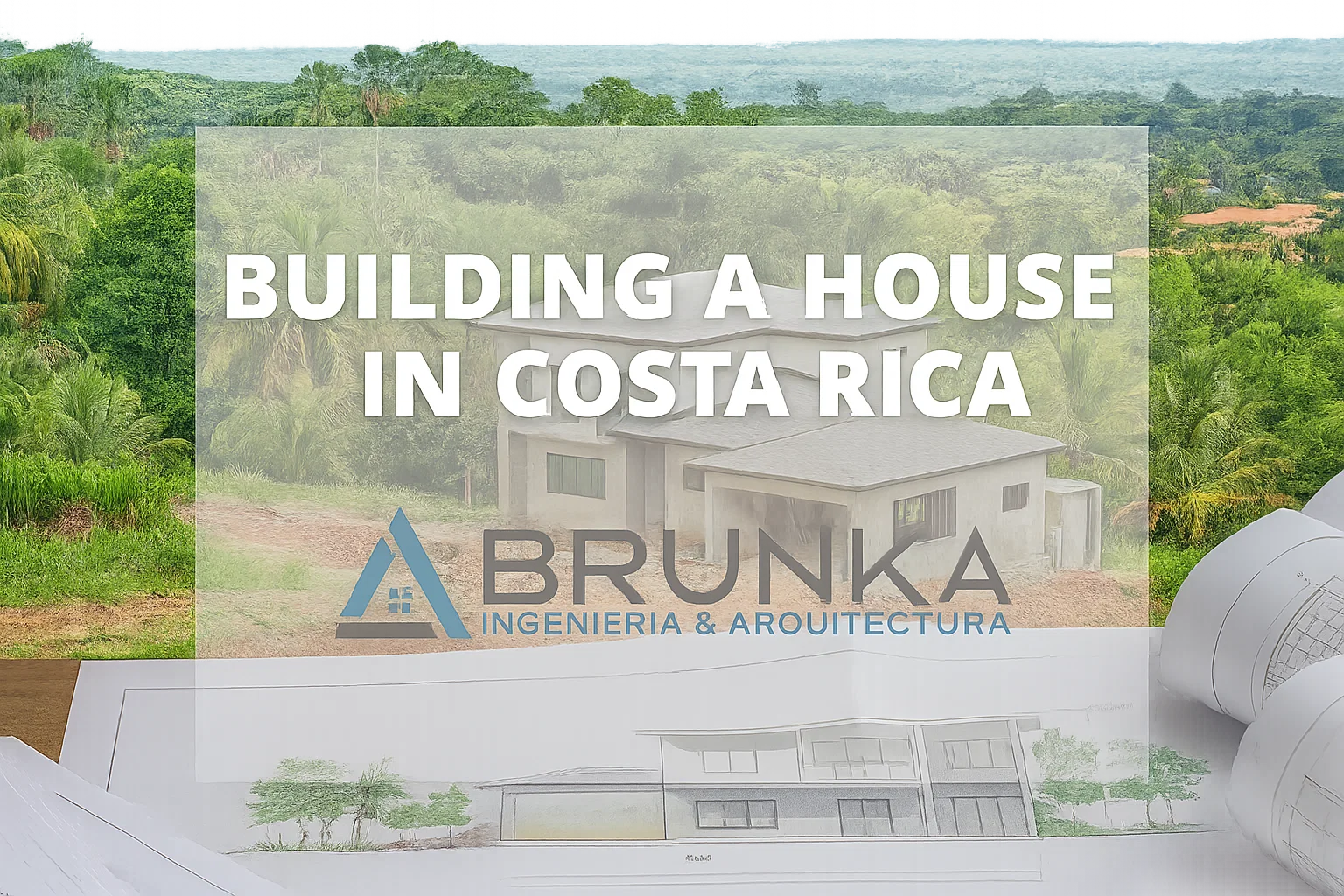
Building a House in Costa Rica: Your Complete 2025 Guide
Thinking about building a house in Costa Rica? Whether you’re an expat looking for a tropical retreat, a digital nomad planning a sustainable home, or a Costa Rican family ready to invest in your dream property, this guide is for you. From architectural design and engineering to permits, construction, and budgeting—this article covers every step of the home-building process in Costa Rica.
At Brunka Architects & Engineers, we’ve helped clients from around the world bring their dream homes to life. Here’s what you need to know to do the same—stress-free and legally sound.
Why Build in Costa Rica?
From its low property taxes and lush natural settings to its political stability and growing expat communities, Costa Rica has become a top destination for real estate investment and custom home construction. Whether you’re looking to build in Tamarindo, Uvita, Nosara, or the Central Valley, the country offers a diverse range of climates and communities to suit your lifestyle.
Foreigners have the same legal rights as Costa Rican citizens when it comes to property ownership, making Costa Rica one of the most accessible places for international homeowners in Latin America.
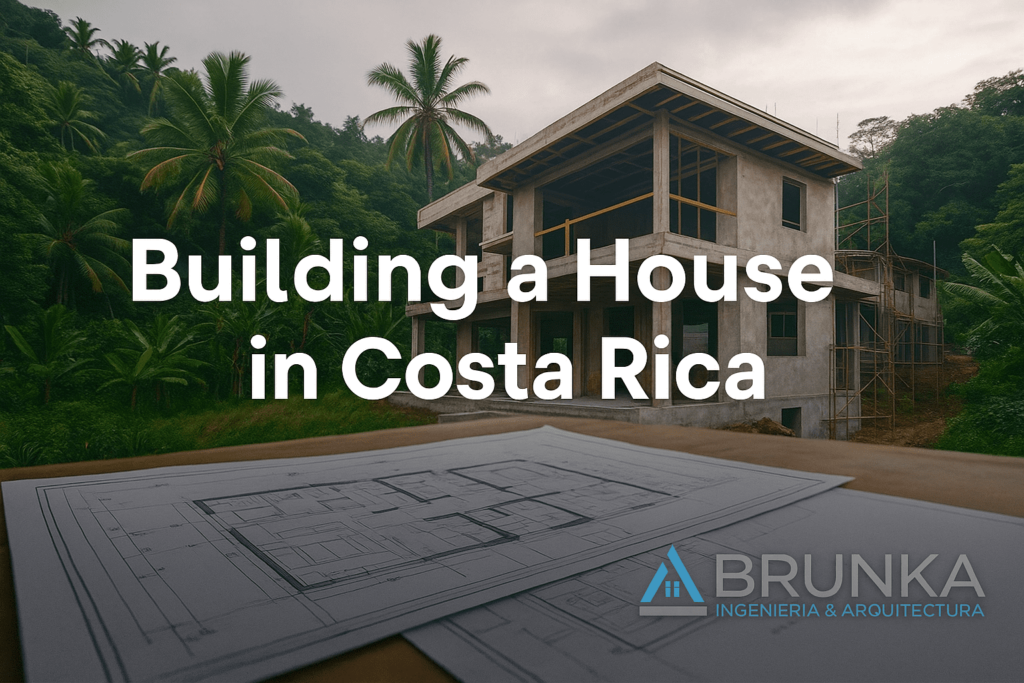
Step 1: Select Your Land and Verify Use Permits
Before building a house in Costa Rica, you need a suitable parcel of land. But don’t buy property blindly. Each municipality enforces its own zoning regulations (Uso de Suelo), and not all plots are buildable.
Our team at Brunka Architects & Engineers performs due diligence, zoning research, topographic studies, and land feasibility assessments before you commit. We ensure your plot supports your intended home, whether it’s a compact modern home or a hillside villa with ocean views.
Step 2: Define Your Budget (and Understand the Real Costs)
The cost of building a house in Costa Rica varies widely depending on location, terrain, materials, and finishes. On average, expect to spend:
- Standard construction: $1,000–$1,300 per m²
- High-end custom builds: $1,400–$1,800 per m² or more
- Eco builds / Off-grid homes: Depends on solar, water, battery tech
We break down cost drivers in our full 2025 Construction Cost Guide.
Keep in mind that you’ll also need to factor in architectural design fees, engineering services, permit costs, and contingencies. Our Project Management Services include transparent budgeting, milestone tracking, and ongoing financial reporting to avoid surprises.
Step 3: Architectural Design That Fits the Climate and You
Designing for the Costa Rican climate is different from traditional North American or European models. We consider:
- Passive cooling: cross-ventilation, roof overhangs, and natural airflow
- Rain-heavy seasons: drainage systems, sloped roofs, permeable materials
- Seismic safety: reinforced foundation and structural bracing
Our Architectural Design Services combine functionality, efficiency, and aesthetics with experience across beach towns, jungle terrains, and highland homes. For inspiration, see our Modern Design Trends for 2025.
Step 4: Engineering and Structural Plans
After your floorplans are finalized, it’s time for technical design. Costa Rican building law requires all plans to be registered with the CFIA (Colegio Federado de Ingenieros y de Arquitectos) by licensed professionals. These include:
- Structural engineering (load calculations, seismic reinforcement)
- Electrical and lighting layouts
- Mechanical and plumbing diagrams
Our Engineering Services cover every discipline required by local and national code.
Want to see what your home will look like before building? Our 3D Rendering Services allow you to explore your future space before it’s built, minimizing costly design changes later.
Step 5: Building Permits, CFIA Registration & Municipal Approval
Before breaking ground, your architect and engineer must submit your plans to CFIA (Colegio Federado de Ingenieros y de Arquitectos) and the local municipality. These institutions verify that your designs meet all technical and legal requirements. Depending on location, permits can take anywhere from 2 to 6 weeks to process.
You’ll need approvals for:
- Municipal construction permits
- CFIA project registration
- Water and electrical services (AYA, ICE)
- Environmental clearance (SETENA), if required
We handle the entire process for you. Visit our Site Plans & Permits page to learn what paperwork is required based on your region and project type.
Step 6: Construction Phase
Once approved, construction can begin. On average, home builds take between 6 and 12 months depending on weather, location, and complexity. We offer full new home construction services including labor coordination, material procurement, scheduling, and quality control.
Our Project Management Services ensure that every contractor, builder, and supplier is aligned and accountable. You’ll receive weekly progress reports, budget updates, and live access to your construction milestones via our digital dashboard.
We also specialize in commercial construction and mixed-use buildings for investors and developers. Every project complies with local seismic and environmental standards as outlined in our Costa Rica Building Codes Guide.
Special Notes for Foreign Buyers and Expats
Building a house in Costa Rica as a foreigner is 100% legal—but it requires knowledge of local legal systems, banking procedures, and trust (S.A.) structures. We help international clients by:
- Coordinating legal ownership through a Costa Rican attorney
- Managing construction remotely with photo/video updates
- Arranging bilingual contracts with all vendors
We’ve worked with clients in the U.S., Canada, Europe, and Latin America. Remote builds are common—and we specialize in delivering them securely and transparently.
Frequently Asked Questions
- Do I need to be in Costa Rica to build? No. We can manage your entire project remotely, though it helps to visit the site at least once during construction.
- What are typical construction delays? Rainy season, supply chain issues, and local holidays can affect timelines. Our planning anticipates these factors.
- What if I want to build off-grid? We have designed and built solar-powered homes with rainwater catchment and compost systems. Just ask.
Final Checklist for Building in Costa Rica
- ✅ Research and secure your land (with proper zoning)
- ✅ Define your home style, lifestyle needs, and budget
- ✅ Work with CFIA-certified architects and engineers
- ✅ Secure all permits from municipality and utility providers
- ✅ Oversee construction with trusted local supervision
- ✅ Obtain Habite certificate and prepare for move-in!
Ready to Build Your Dream Home in Costa Rica?
Brunka Architects & Engineers provides complete architectural, engineering, permitting, and construction services under one roof. Whether you’re local or abroad, we’re your trusted partner from vision to keys in hand.
-
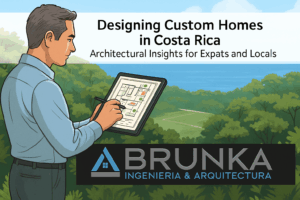
Designing Custom Homes in Costa Rica: Architectural Insights for Expats and Locals
-

Modern Home Design in Costa Rica: Key Features Homeowners Are Choosing Today
-

How Engineering Innovations Are Shaping Sustainable Commercial Buildings in Costa Rica
-

The Benefits of 3D Rendering for Architectural Projects in Costa Rica
-
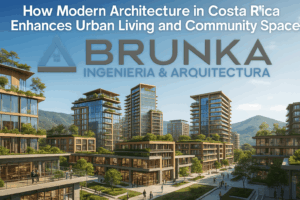
How Modern Architecture in Costa Rica Enhances Urban Living and Community Spaces
-
